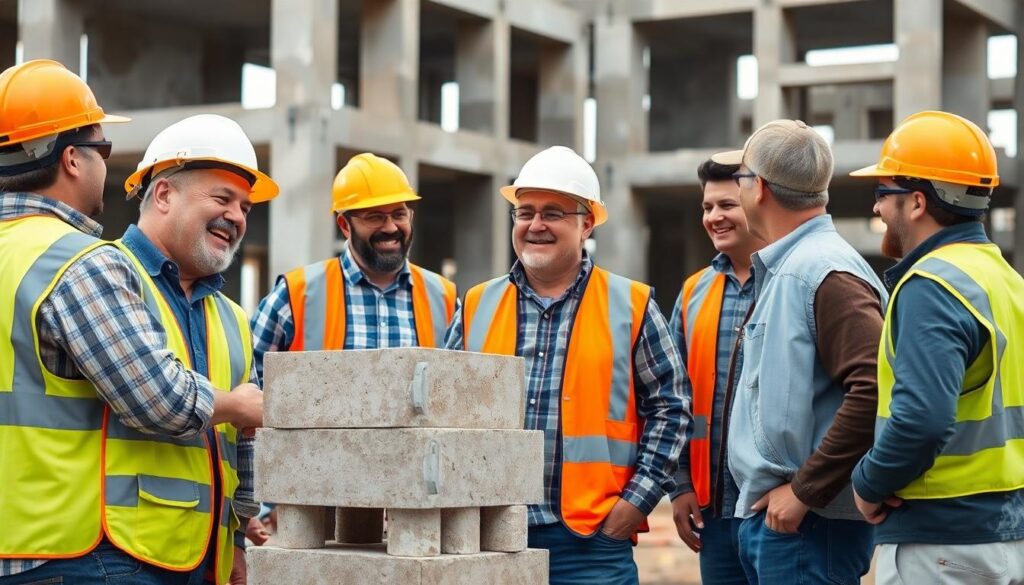Looking for some solid humor? We’ve got you covered with our collection of concrete jokes that are sure to cement your reputation as the funniest person in the room. Whether you’re a construction professional or just someone who appreciates a good pun, these jokes will definitely lay a foundation for laughter.
We’ve poured our efforts into gathering the most structurally sound jokes about concrete, cement, and construction work. From witty one-liners to punny observations, our mix of concrete humor is designed to harden your abs from laughing. So get ready to reinforce your joke repertoire with these concrete classics that never seem to crack under pressure.
The Foundation of Humor: Why Concrete Jokes Are Set in Stone
Concrete jokes stand firmly in the industry of humor because they’re built on solid foundations of wordplay and industry knowledge. These puns mix technical terminology with everyday language, creating a unique blend that resonates with both construction professionals and casual joke enthusiasts. Many concrete jokes rely on the double meanings found in construction vocabulary, playing with words like “setting,” “mixing,” and “hardening” that have both literal and figurative interpretations.
The enduring appeal of concrete humor comes from its accessibility—almost everyone has encountered concrete in their daily lives. Construction workers appreciate these jokes as a lighthearted way to reflect on their daily challenges and experiences. The specificity of concrete jokes actually makes them more relatable, as they transform mundane building materials into sources of unexpected humor.
We’ve noticed that concrete jokes often follow predictable patterns, making them easy to remember and share. Their formulaic nature is part of their charm—you can almost predict the punchline, yet they still manage to crack a smile. Professional comedians have long recognized that industry-exact humor creates an instant connection with audiences who share that knowledge base.
These jokes have cemented their place in construction culture precisely because they solidify group identity and create bonds between workers. Research in workplace psychology suggests that industry-exact humor serves as both a stress reliever and a team-building tool. Their durability in the comedy industry proves that sometimes the simplest structures make for the strongest foundations in humor.
15 Rock-Solid Concrete Jokes That Will Make You Crack Up

Looking for some hardened humor? We’ve gathered the most durable jokes in the construction comedy scene that are guaranteed to cement your reputation as the funniest person at the job site.
Construction Site Classics
- “I tried to tell a joke about concrete, but it was too heavy.” This opening line never fails to break the ice at construction meetings.
- “Why did the concrete refuse to go out? It was feeling laid-back.” Perfect for when the crew needs a quick laugh during a tough pour.
- “What’s a concrete worker’s favorite snack? Rock candy!” Simple yet effective for lightening the mood during lunch breaks.
- “Why was the sidewalk self-conscious? It had too many cracks!” A relatable joke that always gets a smile from veterans in the paving business.
- “What did the builder say to the concrete? ‘You rock my industry!'” This classic one-liner works wonders at industry conferences.
- “Concrete work? It’s always hard!” Sometimes the simplest wordplay gets the biggest laughs on the job site.
- “A concrete mixer orders a drink at a bar: ‘Something stiff!'” This joke sets up perfectly for construction happy hours.
- “What do you call a woodland animal covered in concrete? A badger set!” An unexpected punchline that catches everyone off guard.
Cement Puns That Will Never Crumble
- “What do you call a concrete pun that’s too much? A cemented cliché!” This clever wordplay works for both construction pros and casual joke enthusiasts.
- “Why don’t sidewalks break promises? They’re concrete about commitments!” A solid pun that plays on the reliability of properly installed concrete.
- “How do you fix a broken road? Pave it with good intentions!” This twist on the classic saying always gets a chuckle from roadwork crews.
- “Why was the concrete mixer confident? It knew how to mix things up!” Perfect for introducing new team members to the construction culture.
- “Why did concrete break up with asphalt? It needed space to set.” Relationship humor with a construction twist never fails to entertain.
- “How do you calm an angry slab? Pave it over!” This quick joke works great when things get tense on a difficult project.
- “How does concrete make decisions? It cements its choices!” A philosophical take that adds some depth to your construction humor arsenal.
The Science Behind Concrete Jokes: Why They’re So Hard to Break

The Chemistry of Concrete Comedy
Concrete jokes are built on a solid foundation of puns and wordplay that cleverly tie into construction terminology. These jokes mix technical terms like “cement” with everyday expressions about things being “settled” or having “solid foundations.” Double entendres form the reinforcing rods of this humor, with phrases like “You crack me up!” or “They cement their nerves” working on multiple levels. The brilliance lies in how these jokes merge the literal physical properties of concrete—its brittleness or curing process—with figurative human emotions or actions. We’ve found that this chemical reaction between technical jargon and common language creates a humor compound that’s surprisingly resistant to deterioration over time.
Structural Integrity in Humor
The enduring strength of concrete jokes comes from their expertise recognition factor, where audiences familiar with construction or civil engineering immediately connect with niche references. When someone laughs at “Why don’t concrete walls gossip? They keep things sealed,” they’re demonstrating their membership in an in-group that understands the specialized knowledge. This creates powerful bonding similar to what we see in scientific communities and their inside jokes. The linguistic architecture of these jokes mirrors concrete’s own properties—they’re formulaic and repetitive in structure yet remarkably durable in memory. People remember concrete jokes easily because they establish simple word associations that stick in the mind. Their fundamental design parallels the material they reference—structured, reliable, and built to last through repeated use.
Psychological and Cultural Factors
Concrete humor thrives because of its universal relatability—we’ve all walked on sidewalks or seen construction projects. Jokes like “Why did the concrete break up with the asphalt? It felt the relationship was too paving” work because they connect familiar materials with common human experiences like relationships. These jokes gain their hardiness from physicality-based metaphors that ground abstract concepts such as stability or resilience in tangible material traits anyone can understand. In professional settings, particularly construction sites, concrete jokes serve as perfect icebreakers among workers. They leverage shared jargon to reduce tension and build camaraderie during stressful projects. The jokes function as mental scaffolding, supporting social connections through a foundation of common knowledge and experiences. Their persistence in workplace culture demonstrates how effectively they cement relationships between team members while providing stress relief during demanding jobs.
10 Concrete One-Liners Perfect for Construction Workers

- Solid Plan: I told my friend I was going to start a concrete business. He said, “That’s a solid idea!”
- Love Life: A cement worker said their love life was like RAAC concrete—full of holes.
- Smooth Operators: Why don’t concrete finishers date messy people? They prefer smooth operators.
- Cracking Jokes: What did one concrete block say to the other? “You crack me up!”
- Stable Personality: I dated a concrete worker once—she had a solid sense of humor.
- Foundation of Life: My friend loves concrete—it’s the foundation of his life.
- Argument Winner: Don’t argue with a concrete worker—they’ll just finish you off.
- Rigid Relationship: I knew a concrete worker who broke up with his girlfriend; he found her too rigid.
- Mixing Jokes: My concrete jokes are like a good mix; they never get old!
- Legacy: When the concrete mixer retires, does it cement its legacy or just crack under pressure?
Quick-Setting Quips
The concrete company was famous for its jokes because they always had the right punchline. Construction workers appreciate humor that sets quickly, just like their materials. The cement mixer got fired for always stirring up trouble—a classic example of how these quick jokes can lighten the mood on any job site.
Mix-and-Match Concrete Zingers
What did the cement say to the sand? “We make a great mix!” These versatile one-liners work perfectly when combined with visual cues on the construction site. RAAC concrete’s got more holes than my joke-writing process, but these zingers remain structurally sound in any conversation. Construction workers often customize these jokes by mixing industry-exact terms with everyday situations, creating perfectly blended humor that resonates with colleagues.
How to Craft Your Own Concrete Jokes That Won’t Fall Flat

Start with a Solid Foundation
Building your own concrete jokes requires a strong foundation of construction knowledge. We recommend starting with familiar terms like “mix,” “pour,” “set,” and “cure” that provide excellent opportunities for wordplay. Try incorporating these terms into everyday scenarios for maximum impact. For example, “My relationship with concrete is solid—we’ve never had any cracks.”
Mix in Wordplay Elements
Wordplay forms the structural support of any good concrete joke. We’ve found that using concrete-related terms in unexpected contexts creates the strongest humor. Look for words with double meanings like “solid,” “foundation,” or “hardening” to create puns that connect construction concepts with everyday situations. A perfect example is: “Why did the concrete go to therapy? It was cracking under pressure!”
Pour in Some Industry Knowledge
Construction terminology provides rich material for joke crafting. We suggest using exact concrete terms that most people recognize but applying them in surprising ways. Cement trucks, sidewalks, and foundations are all recognizable elements you can incorporate. Consider this example: “I dated a concrete worker once—she had a solid sense of humor but couldn’t mix well with my lifestyle.”
Allow Your Jokes to Set Properly
Timing matters in concrete jokes just as it does in concrete setting. We’ve learned that the best concrete humor often relies on the pause before the punchline. Give your audience time to make the connection between the setup and the concrete-related twist. For instance: “What do you call the place where concrete is buried? A cementary.”
Reinforce with Common Idioms
Taking familiar phrases and giving them a concrete twist strengthens your joke’s structure. We encourage using idioms like “on solid ground” or “set in stone” as foundations for your humor. Try this approach: “The concrete finisher said I’d never leave her, but I saw the cracks in her argument.”
Test Your Structural Integrity
Before sharing widely, test your concrete jokes with a small audience. We’ve noticed that jokes about concrete work best when they’re relatable to both construction professionals and the general public. If your joke only resonates with specialized workers, try broadening it with more common references. A good example is: “Why don’t sidewalks break promises? Because they’re always concrete about commitments!”
Famous Concrete Jokes Throughout History

The Classic “You Crack Me Up” Joke
One of the most enduring concrete jokes features two concrete blocks in conversation. The punchline “You crack me up!” plays on the literal fissures in concrete while using a common expression for laughter. This joke has circulated widely in construction circles and remains a staple in concrete humor collections. Its longevity stems from the perfect blend of visual imagery and wordplay that resonates with both professionals and casual observers.
Construction Profession Humor
Construction workers have crafted many jokes about their cement-related duties. A popular example is “Why did the cement mixer get fired? For stirring up trouble!” These workplace jokes often incorporate industry terminology while poking fun at the daily challenges faced on job sites. Another variation involves workers needing to “cement their nerves” to stay calm during difficult projects, creating a humorous parallel between material properties and human emotions.
Relationship Analogies in Concrete Comedy
Concrete jokes frequently use relationship metaphors for comedic effect. The pun “Why did concrete break up with asphalt? It felt the relationship was too paving” demonstrates how construction materials serve as perfect metaphors for human connections. Similarly, jokes about cement and gravel partnerships with punchlines like “You complete me” have become recurring themes in construction humor, blending technical knowledge with relatable situations.
Musical Connections in Cement Humor
The heavy equipment used in concrete work has inspired many music-related jokes over the years. Cement mixers are often humorously associated with “heavy rock” music, creating a dual meaning that appeals to construction workers and music fans alike. Jokes about concrete bands laying “strong tracks” represent another example of how industry terminology seamlessly integrates with cultural references to create memorable humor.
Therapy-Themed Concrete Jokes
Self-deprecating humor appears frequently in concrete joke collections, often personifying the material with human characteristics. Lines like cement seeking therapy for “cracking issues” or feeling “walked all over” give concrete human qualities while highlighting its actual physical properties. These anthropomorphic jokes have become particularly popular in modern construction humor, adding a psychological dimension to material-based comedy.
Cultural Impact of Concrete Humor
Though no single “historic” concrete joke stands above the rest, the genre’s significance comes from its adaptability across different contexts. Construction communities have embraced concrete humor as both entertainment and team-building tools. These jokes first gained popularity during the 20th century, coinciding with advancements in construction terminology and pun-based comedy trends. Their persistence in modern times, especially through online platforms, demonstrates the enduring appeal of construction-themed humor across generations of workers.
When Concrete Jokes Go Wrong: Humor That Didn’t Set Properly

Concrete humor relies heavily on puns and wordplay involving construction terminology, often using terms like “cement,” “set,” “crack,” and “mix” for comedic effect. While generally lighthearted, these jokes can sometimes crumble under pressure due to several common issues. We’ve identified the key reasons why concrete jokes might not set properly with your audience.
Overreliance on Cemented Clichés
Predictable punchlines and overused setups quickly become stale in the industry of concrete humor. Jokes that have been repeated countless times, such as “Why did the concrete go to therapy? It was cracking under pressure!” lose their impact through familiarity. These cemented clichés fail to surprise the audience, resulting in polite smiles rather than genuine laughter. Fresh material stands a much better chance of making a solid impression than recycling the same old jokes everyone has heard before.
Forced Wordplay
Sometimes concrete jokes fall flat because they stretch too far to make a connection. Attempts to blend construction jargon with humor can result in strained analogies that confuse rather than amuse. Comparing joke delivery to a “concrete mixer churning out the same old material” might seem clever at first, but often requires too much explanation to land effectively. The best wordplay feels natural and intuitive, not laboriously constructed.
Audience Mismatch
Industry-exact humor creates a barrier for general audiences unfamiliar with technical terminology. Jokes referencing specialized terms like “RAAC concrete’s got more holes than my joke-writing process” will likely miss the mark with people who don’t know that RAAC stands for Reinforced Autoclaved Aerated Concrete. We’ve found that successful concrete jokes balance industry knowledge with universal appeal, ensuring they don’t exclude potential laughers.
Unintended Literal Interpretations
The line between clever wordplay and confusion can be thin with concrete humor. Statements like “I told my concrete it was too heavy—now it’s feeling a bit weighty” risk being perceived as literal complaints rather than humor. These jokes fail when the audience misses the intended pun and takes the statement at face value, leaving them puzzled instead of amused.
Examples of Unsuccessful Delivery
Watching a concrete joke fall flat can be as painful as dropping a bag of cement on your foot. Here are some prime examples of concrete humor that didn’t quite set:
- Predictable Punchlines: “You crack me up!” between concrete blocks has been overused to the point of becoming humor rubble.
- Overly Technical References: “The comedian and the concrete built a great rapport” requires understanding “rapport” as a play on “rebar port,” a niche construction term few people recognize.
- Misdirected Tone: Jokes about “dirty concrete” or “grumpy slabs” often leave audiences confused about whether they should be laughing or concerned about construction quality.
Mitigation Strategies
Effective concrete humor requires balancing relatability with creativity. We recommend avoiding overused setups and ensuring your terminology remains accessible for broader audiences. Testing jokes with small groups before using them in larger settings helps identify potential issues with delivery or comprehension. The strongest concrete jokes, like the best concrete mixtures, combine quality ingredients in the right proportions to create something that stands the test of time.
Conclusion: Cementing Your Reputation as a Concrete Comedy Master
We’ve poured our hearts into sharing these concrete jokes that are built to last. From one-liners to historical quips these jokes provide the perfect foundation for lightening the mood at any construction site or gathering.
Remember that the best concrete jokes mix technical knowledge with accessible humor creating connections that set quickly and cure into lasting memories. Whether you’re telling classics or crafting your own unique puns you’re building relationships one laugh at a time.
So go ahead and add these solid jokes to your repertoire. They’ll reinforce your status as the site comedian and prove that even in the hardest industry a little humor goes a long way. After all nothing brings people together quite like jokes that are as strong and reliable as concrete itself.
Frequently Asked Questions
Why are concrete jokes popular in the construction industry?
Concrete jokes serve as stress relievers and team-building tools in the demanding construction industry. They create bonds among workers and solidify group identity through shared humor that combines technical terminology with everyday language. These jokes are accessible to both professionals and casual enthusiasts, making them perfect icebreakers in professional settings while fostering a sense of belonging and camaraderie.
What makes a good concrete joke?
A good concrete joke has a solid foundation of construction knowledge, incorporates familiar terms like “mix,” “pour,” and “set,” and uses effective wordplay. The best jokes blend industry terminology with common idioms, have good timing, and remain relatable to both construction professionals and the general public. They should be easy to remember, quick to deliver, and sturdy enough to stand the test of time.
Can you share a few examples of classic concrete jokes?
Some classics include: “I tried to tell a joke about concrete, but it was too heavy,” “Why don’t sidewalks break promises? They’re concrete about commitments!” and “I told my friend I was going to start a concrete business. He said, ‘That’s a solid idea!'” Another favorite is “What did one concrete block say to the other? ‘You crack me up!'”
Why do some concrete jokes fail to land?
Concrete jokes often fail due to overreliance on clichés, forced wordplay, audience mismatch, or unintended literal interpretations. When jokes don’t balance relatability with creativity or use stale setups, they don’t “set” properly with audiences. Successful concrete humor needs to be accessible while still maintaining originality and a connection to shared experiences in construction.
How can I create my own concrete jokes?
Start with construction knowledge and terminology. Use words like “mix,” “pour,” and “cure” for wordplay opportunities. Incorporate common idioms related to strength, foundation, or solidity. Test your jokes with a small audience before sharing widely. The best original jokes blend technical understanding with universal humor concepts and often play on the dual meaning of “concrete” as both literal material and figurative certainty.
What’s the historical significance of concrete humor?
Concrete humor has a rich tradition in construction communities, featuring classics like “You crack me up” that have endured for generations. These jokes have evolved from simple wordplay to include relationship analogies, musical connections to “heavy rock,” and even therapy-themed jokes personifying concrete with human emotions. They’ve become cultural touchstones that unite workers across different eras and construction specialties.







